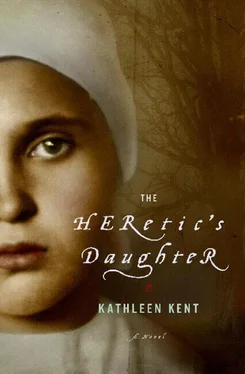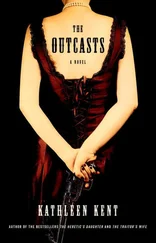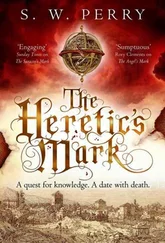“Later Father came and sat with me. He didn’t say anything at first. He just sat until it came full-on dark. And then he started to talk. He told me I was his namesake because I was most like him. It started me up, Sarah, for I had always thought Richard most alike to Father. He said that some people can live from birth to death and have no more thoughts in their heads about the reasons for living than a beetle. But that we were different, he and I. We needed more than a clod of dirt to make our rising up and lying down worth something.
“I told him I would rather die than wind my days out only plowing and dusting clay off my shoes. Then he said if I were to die, a piece of him would die, too. He said I had to find one thing living that was greater than myself to cleave to, and in that would be my strength for walking upright like a man. A long time ago he was in despair and had sunk so low as to die from it. But he found Mother, and it was her that brought a quickening back to his living. I thought long on what he had said. And d’ye know what I told him, Sarah?”
He squeezed my hand painfully in his and paused, his voice choking into silence. He struggled for several moments to speak again and I waited for him to pour out his grief for Mother. But when he spoke, he said, “I told him it was you. It’s you who are my strength. You mustn’t die, Sarah, and leave me in this dark place.”
A drowsiness had come over me and my eyes started to close. I could hear Tom’s voice and I wanted to answer him, to reassure him that I would not leave but I could not find the breath to form the words. It seemed such a simple thing to sink beneath the weight within my chest, and in that moment I thought of Miles Corey beneath his blanket of stones. Breathing a little less and a little less each time until each rib was still and fixed. I pressed Tom’s fingers in mine and slept.
ILAY SOMETIMES in flames, the straw glowing and then catching fire. The fire driving legions of rats and armies of lice before it across the floor to disappear like smoke under the door. Other times I lay locked in the cold-cellar, turning to ice, turning to stone, turning to bone and frozen ash. And always were the churning wet sounds of the bellows within my ribs struggling to work against a slow drowning. Once I opened my eyes and saw Margaret sitting next to me, her long black hair loose and wild about her shoulders. I shook my head, squeezing my eyes shut to drive this apparition away, but when I opened my eyes again, she was there. I felt a pressure on my arm and she said, “They have taken my poppet, Sarah. The one you gave me.”
Like an ancient crone I croaked out, “They have taken mine as well.” I looked for Tom to place me back into the hard world again but I could not see him.
She leaned in closer and whispered, “You mustn’t blame Father. He means well and he loves us all. He is but a little distracted these few days past. But look, see what I have found for you.” She reached into her sleeve and pulled out a short length of thread.
“You see, I have a bit of ribbon for you. I have learned how to do it from Father. But once it has appeared, I cannot make it disappear again as Father would do.” She placed it gently on my chest. She smiled sweetly, her eyes drifting into the unfocused and slanting gaze of one who would follow the footsteps of fairies off a canted cliff. She lay down beside me, wrapping her arms around my shoulders, and kissed me. Her lips were cold and smooth as riverbed stones but her breath was warm and she sang to me, “We shall always be sisters.” I fell back into sleep and dreamt of swimming in a great dark ocean.
THERE WAS NEVER a time that Tom or Margaret would leave my side for very long. I do not know what Aunt made of Margaret’s attentions to me, for she never again spoke to me, but she also never called for Margaret to return to the far side of the cell. I gave to Margaret the ancient piece of pottery that I had carried in the bodice of my dress for so many weeks and told her that if I should die, she would have something from me to keep with her always. The hard clay had for so long pressed against my breastbone that its absence felt as though I had given her a part of my rib. She delighted in it, looking at it, turning it over and over in her palm. When I showed her the cross-stitch piece that I had worn close to my heart, she wept and, drying her tears with it, tucked it back into its place.
When I had the strength to ask questions, Tom revealed to me what I had only imagined in my sickness and what had truly taken place. Some of the women in the cell had indeed taken turns caring for me, although most of them had given me up after a few days of raging fever. The only one who continued to watch vigil while Tom and Margaret slept was Lydia Dustin, the old woman with the sharp tongue. Two dogs had been hanged, one in Salem and one in Andover, for being familiars to the Devil. One of the prisoners, a young woman seven months into the family way, gave birth in silent agony to her first child. With a sudden understanding I knew that the meowing of the cat I had heard must have been the cries of the infant. The babe had quickly died and there would be no more for the girl, who all but poured her own life’s blood into the straw.
In dismay I reminded Tom of the message I was to give Father from Dr. Ames but had lost again in my ravings. But Tom assured me he had passed it along word for word as it was given to me. When I asked Tom what it meant he said Father had told him that Dr. Ames and his fellows were New Levellers. When Tom asked Father what it meant, he responded only that they were men who believed that all men were to be protected equally under the common law. And that each man was to be free to follow his own conscience in practices of religion. I remembered the Quaker man in Uncle’s barn, the man Margaret had called a heretic for believing such, and wondered if Dr. Ames was secretly a Quaker.
My fever rose again even as the cold of autumn dug in, and we all pressed together tighter for warmth. In a few weeks the groundwater would start to freeze and the first snows would drift through the high westward portals, dusting white our hair and lacing and stiffening our thin shawls to parchment. Margaret would lie next to me by the hour, rambling in her speech about the trial or her home in Billerica. At times she defended herself to invisible judges, which left her melancholy and spiritless, as though she had caught my fever and was jaded because of it. But she was always tender to me. Washing my face or urging me to drink broth when it could be had, or using the sordid light to pick from my scalp the lice that tormented me so.
It is often at sunset that the vital protective channels of the body are at their lowest. A fever will rise, a woman with child will ready herself for labor, the spirit will darken with the shadows and weaken. It was at such a time that I felt overcome by my guilt and I poured out my confession to Margaret.
“I have killed my own mother,” I cried miserably into my hands. She held my head and rocked me, smoothing my hair back from my face. She smiled and bent to whisper something in my ear.
She said, “Shall I tell you a secret?” I nodded, for I remembered well the secrets we shared together when I lived with her family, and I expected her to tell me something pleasantly distracting.
“Hush, now. Don’t cry. I have seen her only yesterday and she is well.” She nodded and looked off to a far corner of the cell.
The well of my mouth dried to dust and I whispered, “Who?”
She seemed not to hear me and continued on as she deftly plaited strands of my hair. “If I gather your hair so, it will not pull and we will not have to fever-cut it to the scalp. But you have knots that will never come out. That’s the thing about knots. They are easier tied than untied.”
Читать дальше












